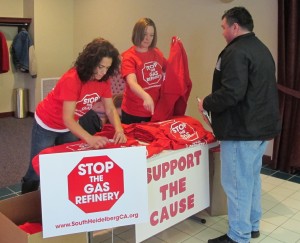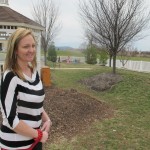Economics may hinder Berks County gas-to-liquids plant
-
Marie Cusick
A proposal to build a plant that would transform Pennsylvania’s cheap, abundant natural gas into more expensive motor fuel is generating controversy in Berks County. If built, the gas-to-liquids (GTL) plant would be one of the first facilities of its kind in the United States.
But industry analysts say there’s a reason these kinds of plants are so rare– the economics often don’t make a lot of sense.
“Homes all around”
Jen Byrne watches and worries as children run around the playground behind the day care she owns. If the plant is built in South Heidelberg Township, it would be—literally–in her backyard.
“I thought there’s no way they’d put that right there,” she says, looking out at the empty lot. “We have all these children here. There’s homes all around. My biggest concern is air and water pollution.”
The idea behind the GTL facility is to transform Pennsylvania’s natural gas into expensive liquid motor fuel–it would produce gasoline that can go right into a car.
The facility is projected to cost $800 million to $1 billion and produce about 500,000 gallons per day of gasoline and liquid petroleum. It’s planned for a 63-acre site about 10 miles west of Reading. Although the land is zoned for light industrial uses, it’s currently an empty field surrounded by residential neighborhoods.

Marie Cusick/StateImpact Pennsylvania
The newly-formed South Heidelberg Township Community Association opposes the GTL plant.
Once word got out about the plans, a concerned citizens group quickly organized. They printed up bright red “Stop the gas refinery” yard signs, t-shirts, and flyers. Nearly 300 people attended a recent meeting hosted by the group.
A Canadian developer, EmberClear, is seeking to develop the GTL plant. Jim Palumbo is a project manager for the company. He says the plant will create about 150 permanent jobs.
“We have an abundance of natural gas in the state. It makes all the sense in the world to use it in some fashion,” he says. “We want to be good neighbors. We don’t want to do something that would be a detriment to the neighborhood.”
“Extraordinarily high capital costs”
Although EmberClear is facing strong community opposition, analysts say there’s an even bigger hurdle– money.
GTL plants are incredibly expensive to build and require many years of low natural gas prices, along with many years of high gasoline prices. Right now the price spread looks enticing, but it may not last.
Shell recently backed out of a $20 billion GTL project in Louisiana. And that’s not a good sign for the viability of these types of plants, says Alexandra Zelubowski, a senior analyst with the global research firm IHS.
“I think a lot of investors are still wary of whether that price difference of natural gas to oil is going to be sustained over a long period of time–sufficient to justify these extraordinarily high capital costs,” she says.
Only five GTL plants are currently operating in the world. None exist yet in the United States.
“We consider a plant to be existing or in the real planning stages when they have broken ground,” says Vishakh Mantri of the U.S. Energy Information Administration.
So far no one has broken any ground in Pennsylvania—although permits have been submitted to the state Department of Environmental Protection for another GTL facility in Altoona, Blair County.
But looking at the Berks County project, Zelubowski is doubtful it will happen.
“My guess is this project won’t forward,” she says. “Just because of the high cost and really the lack of need for additional gasoline in the region right now.”
Palumbo points out that EmberClear is the developer. His firm would hand off the plant to a yet-to-be-determined company to operate it. The site is also next door to Sunoco Logistics’ Sinking Spring facility. The plan is for Sunoco to buy and store the gasoline made at the GTL plant.
“There are several companies out there—I don’t want to mention names—but they’re saying, ‘Look you build it, and we’ll become your partner,'” Palumbo says. “There’s not just one. There’s a few of them.”
Meanwhile, residents like Jen Byrne have vowed to continue fighting to keep the plant out of their backyards.
“It makes me extremely uncomfortable,” she says. “I don’t know how I could come in everyday and say to my families, ‘Bring your kids here because this the safest place you’ll find.’”
South Heidelberg Township supervisors will vote next month on whether to grant final approval to the plant’s site plan. If the project moves forward, construction could begin by the middle of next year.

















